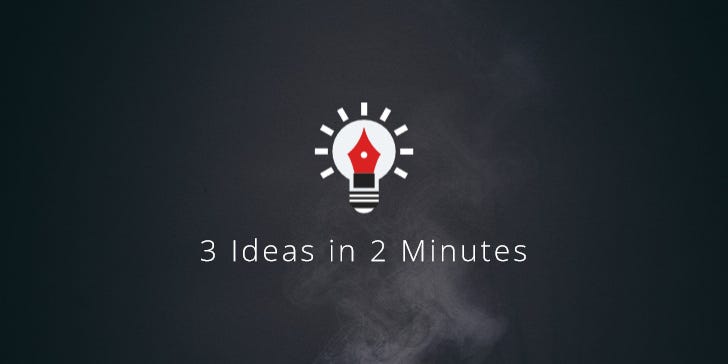#128: Standard Operating Procedures, Collective Action Problem & Schelling Point
3 ideas in 2 Minutes on Action and Inaction
I. Standard Operating Procedures
A Standard Operating Procedure (SOP) is a set of instructions designed to help people complete a routine task. Here’s how they should be developed according to leadership instructor Jocko Willink:
One of the best things you can do if you have to come up with an SOP, not only let it come organically from the task itself. But let the people that are actually doing the task come up with the Standard Operating Procedure.
If you had some project that you did over and over again I wouldn’t come over and say: “Here’s how I want you to do this project from now on.” I would say: “Since you’re doing this all the time, can you capture what it is you do and we can take those best practices, turn them into an SOP and get them through the whole organisation?”
II. Collective Action Problem
Say you’re playing a good old-fashioned game of chicken. You and your arch-nemesis are driving towards each other in an attempt to figure out who has to pay for lunch. A head-on crash is rather undesirable for both. The problem is that the best outcome for each player is for the other driver to yield.
You’re facing a primitive form of Collective Action Problem, a social dilemma in which everyone would be better off cooperating. If it weren’t for the conflicting interests between the individuals that prevent said cooperation. The game of chicken is similar to the Prisoner’s Dilemma in which two captives have to decide whether they rat out their accomplice or stay loyal.
III. Schelling Point
How do you cooperate if you cannot communicate? According to the game theory concept known as Schelling Point, you rely on social norms.
Suppose I want to meet with you, but I don’t tell you where or when to meet. You also want to meet with me, but we can’t communicate. That sounds like an impossible problem to solve — we can’t do it. But not quite.
You can use social norms to converge on a Schelling point. I know you’re rational and educated. And you know I’m rational and educated. We’re both going to start thinking.
When will we meet? If we have to pick an arbitrary date, we’ll probably pick New Year’s Eve. What time will we meet? Midnight or 12:01 a.m. Where will we meet? If we’re Americans, the big meeting spot is probably New York City, the most important city. Where in New York City will we meet? Probably under the clock at Grand Central Station.
In Berlin, Germany I’d go for the World Clock at Alexanderplatz as a meeting point. In Melbourne, Australia, the old post office at Bourke Street Mall seems to be the best option. What’s the most likely meeting spot where you live? 🐘
Merry Christmas and Happy Holidays🎄
Chris
themindcollection.com


